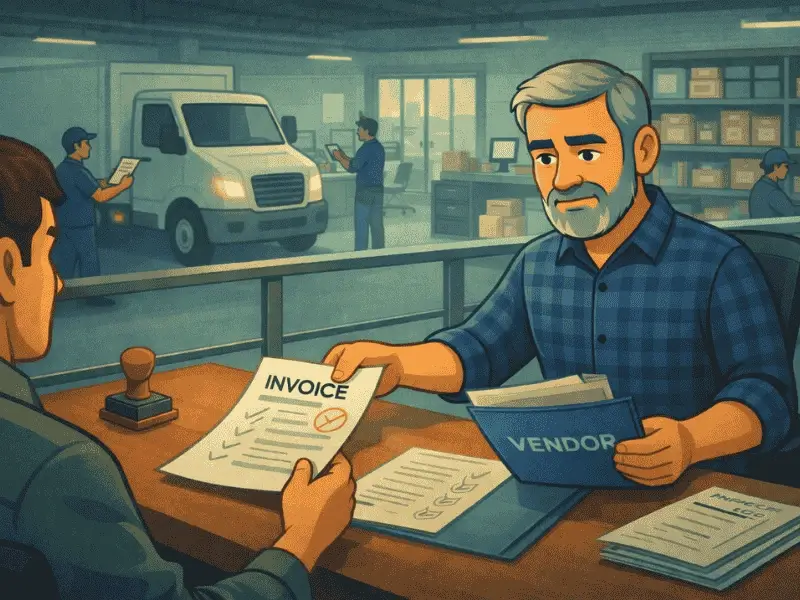Key Takeaways
What are the ways by which Fleet Managers can assist Small Businesses?
Fleet managers can be instrumental in helping small businesses save money and improve efficiency. With the right tools, fleet managers can implement strategies to reduce operating costs while increasing overall revenue. By optimizing vehicle performance, reducing fuel costs and insurance premiums, improving customer satisfaction levels and increasing overall efficiency, a fleet manager can be essential for any business with five or more vehicles.
The value of having a fleet manager can be seen in the cost savings, improved efficiency, and enhanced customer service that they provide. Put your business on the road to success with a professionally managed fleet!
1) Acquiring a vehicle
Vehicle acquisition is an essential part of fleet management and requires careful consideration. When making purchase decisions, fleet managers consider the type of fleet vehicle best suited to the business needs as well as how many vehicles will be needed. They also help decide whether to buy vehicles outright or lease them. When purchasing vehicles, it is important to take into account fuel economy and maintenance costs as these factors can significantly affect operating costs. A fleet manager can make sure that their business’s vehicle acquisition process is both cost-effective and efficient.
2) Compliance
Compliance is essential for any successful fleet management program. Compliance pertains to maintaining the safety and legality of the vehicle while being driven, which encompasses ensuring proper registration, licensing, and maintenance. To ensure that vehicles are kept in compliance, fleet managers ensure that all drivers have valid licenses and that all vehicles used by their company are properly registered.
Additionally, they also check that all applicable safety inspections are up to date and perform regular maintenance checks to make sure vehicles are running smoothly.
Finally, it is important to stay up-to-date with changing laws and regulations so that you can remain compliant with them at all times.
3) Vehicle Maintenance
Vehicle maintenance is essential for any successful fleet management program. It includes both routine inspections and preventive maintenance, as well as repairs when they are needed. Regularly checking the tires and brakes, oil changes, and other services are important to keep vehicles in good condition and running smoothly.
Additionally, if vehicle issues are addressed early on, then it can reduce the chances of more costly problems such as breakdowns or failures. A great way to do this is through routine inspections. In case an issue arises, it becomes the responsibility of the fleet manager to provide the necessary roadside assistance to the vehicle.
Finally, stay up-to-date with changing laws and regulations so that you can remain compliant with them at all times. Proper vehicle maintenance is key for a successful fleet management program.
4) Preparing for a trip
Effective trip preparation is essential for any successful fleet management program. It includes ensuring the commercial vehicle and driver are prepared for whatever journey lies ahead. This means making sure that the vehicle has been properly inspected and is in good working condition.
Finally, it's important to stay up-to-date on changing laws and regulations so that you can remain compliant with them at all times. Proper trip preparation is key for a successful fleet management program.
5) Tracking of vehicles and cargo
Vehicle and Cargo Tracking is a critical component of any successful fleet management program. By tracking individual vehicles, as well as the cargo they carry, fleet managers are able to monitor their operations in real-time and make necessary adjustments to schedules or routes in order to maximize efficiency.
This tracking also provides insights into driver behavior, such as speed and fuel usage, allowing for better decisions about how best to manage the business's resources. Additionally, cargo tracking can help prevent theft by alerting fleet managers when a trailer is missing or has been tampered with.
6) Safety for drivers
Driver safety is an essential consideration for any fleet manager. Proper training and monitoring of driver behavior can help reduce the risk of accidents on the road, limiting the company's liability costs, insurance premiums, and ensuring that drivers remain safe.
Fleet managers look to implement comprehensive training programs which focus on teaching safe driving behaviors like obeying traffic laws, using signal lights properly, and maintaining a safe speed. They also monitor their drivers' acceleration rates, on-time trucking hours, and braking speeds to identify potentially dangerous habits which could put them at risk.
By taking these steps, fleet managers can ensure that their drivers are protected from harm while still making sure their business fleets run efficiently.
7) Keep records
Record keeping is an important part of fleet management. Keeping accurate records of the fleet’s maintenance history, mileage, fuel consumption routes taken, and any damage or issues it has sustained can be invaluable for tax and insurance purposes.
It also allows fleet managers to easily stay on top of any services or repairs that need to be completed. The most effective way to keep detailed records is through a comprehensive fleet management system which can store all the relevant data in one place. This ensures that all information is up to date and easily accessible when needed. By implementing a reliable record keeping system, fleet managers can ensure that their fleets are running safely and efficiently with minimal disruptions caused by unexpected vehicle issues or delays.
8) Analyze and optimize your fleet
Fleet analysis and optimization is an essential part of fleet management. From analyzing fuel costs to monitoring driver safety, it is vital to identify any areas of inefficiency or potential improvement and make the necessary adjustments. Through careful analysis, a fleet manager can identify opportunities for cost savings and improve customer service.
Fleet optimization involves identifying areas such as excessive idling, fuel usage, maintenance schedule, hours of service, and vehicle tracking that may need further attention. By making sure that all these aspects are running smoothly, fleet managers can ensure their fleets are running efficiently with minimal disruption.

Why small fleets choose Simply Fleet
Small fleets choose Simply Fleet for a variety of reasons. Simply Fleet is a fleet management software that helps businesses manage their vehicles efficiently, reduce costs, and increase safety. Simply Fleet's pricing plans and features make it an affordable option for small businesses looking to improve their fleet management processes and reduce costs.
Simply Fleet requires no IT cost, is easy to setup, and gives the fastest ROI —all with minimal effort!
In conclusion, proper fleet management software is essential for businesses of all sizes, but it is especially important for small fleets. By taking advantage of the tools and strategies discussed above, dedicated fleet managers can ensure that their business fleets are running smoothly and efficiently, saving them time and money in the process.



.png)








.png)


.png)










